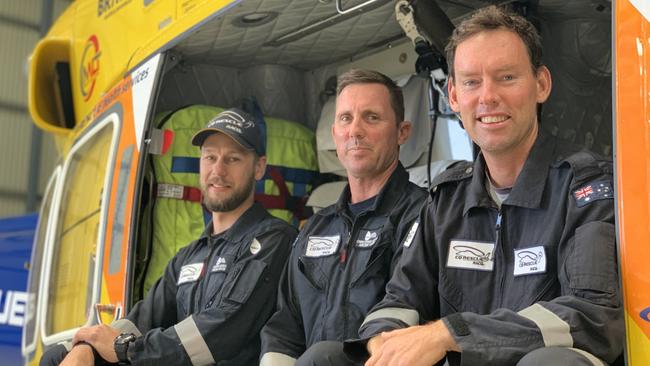Helicopter rescue doctor, aircrew share their frontline missions
Whether it is a sick patient on a cruise ship off the Whitsundays or a tractor crush on a cattle property out west, these Qld chopper heroes will fly to anyone, anywhere at anytime to save a life. Read why they put themselves on the frontline of critical care.
Community News
Don't miss out on the headlines from Community News. Followed categories will be added to My News.
For Quinton Rethus, the chance to help people get back safely to their families is the reason he flies on a rescue helicopter.
“It can be quite a rewarding job,” the RACQ CQ Rescue aircrewman said.
“And we have a wide variety of tasks that we need to complete to help keep the aircraft in the air and be able to provide the service that we do.
“That ranges from assisting the pilot up the front with cockpit duties through to crawling into the rear cabin to conduct winch operations.”
The service has two Bell 412 choppers, one primary and one on standby, to cover a vast terrain four times the size of Tasmania.

The men and women who fly in them take on a range of jobs, day or night, from hospital transfers and primary recoveries at mine sites and farm properties to roadside winches and search-and-rescue missions off the coast.
Mr Rethus said the 24/7 nature of the job made it a challenge, “but I guess that is what attracts us to this kind of work”.
Critical care health professional Dr Siva Sivanujan Critical said work on a rescue helicopter could not be “scripted” and he depended on his medical training and experience to make good decisions in high-pressure, time-sensitive situations.

“We also discuss cases,” he said.
“We have a robust system of clinical audit, or a case-based discussion weekly.
“So you learn from other doctors, other paramedics and other medical personnel and by discussing you can live that experience a little bit and you can apply it.
“But you can’t script these cases.”
Dr Sivanujan said chopper doctors also depended on paramedics and the aircrew to get good outcomes.

“We work in very austere environments, in small teams, me and my paramedic and we use the aircrew if possible to assist us because the environment can be very challenging,” he said.
“Too much light, no light, too much noise, no noise and the temperature is variable.”
Dr Sivanujan said he was inspired to take up the high-pressure job from his past experience working in anaesthetics and Intensive Care Units.
“The satisfaction of doing something and achieving, although it may be simple, just taking a patient from A to B, from primary response to the islands to the beach, the roadside and from farms and paddocks, it is really interesting and challenging,” he said.
“You don’t have to be an adrenaline junkie to do that.”





